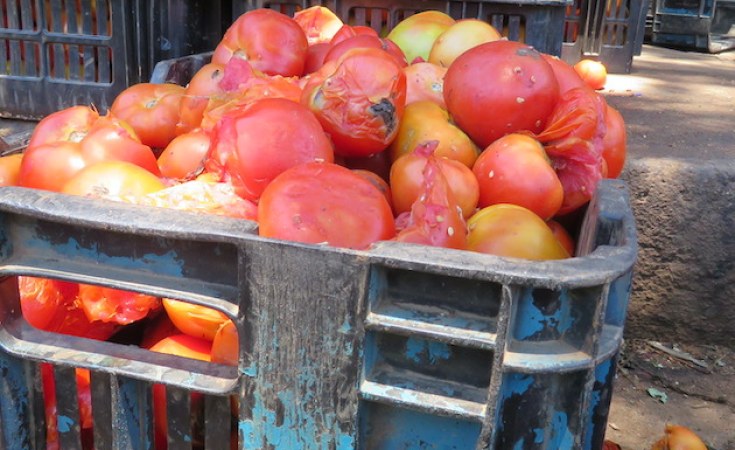As the world marked the International Day of Awareness on Food Loss and Waste Reduction on September 29, Nigeria finds itself at a critical juncture. This global observance is dedicated to raising awareness about the staggering amount of food lost or wasted each year, and in a country where millions face hunger and malnutrition, the message is particularly urgent. Nigeria, Africa’s most populous nation, is grappling with food insecurity, high levels of poverty, and a struggling agricultural sector. Yet, nearly 40 per cent of the food produced here is lost or wasted annually. This paradox—of abundance on one hand and scarcity on the other—requires immediate action if Nigeria is to meet its development goals and feed its growing population.
Food loss in Nigeria predominantly occurs at the post-harvest stage, as crops rot in the fields, markets, or during transportation due to poor infrastructure, inadequate storage facilities, and limited access to modern agricultural techniques. In a country that relies heavily on road transport and where the agricultural sector is the backbone of the rural economy, these challenges lead to significant financial losses. Millions of small-scale farmers, who depend on agriculture for their livelihoods, are particularly hard hit. They watch as a portion of their hard-earned harvest is lost before it reaches consumers, depriving them of income and exacerbating the cycle of rural poverty.
Beyond the immediate economic impact on farmers, food loss has broader consequences for Nigeria’s economy. The country loses billions of dollars each year due to inefficient agricultural practices and inadequate infrastructure. These losses deprive Nigeria of much-needed revenue that could be reinvested in agricultural modernisation and rural development. More importantly, this inefficiency denies millions of Nigerians access to affordable and nutritious food, contributing to widespread hunger and malnutrition. In a country where over 25 million people face food insecurity, this is a crisis that can no longer be ignored.
Food waste, meanwhile, is a growing issue in urban centers. Nigeria’s rapidly expanding cities are increasingly home to affluent populations with higher consumption rates. Supermarkets, restaurants, and households in these cities contribute to food waste by discarding unsold or uneaten food. This waste represents a missed opportunity to address food insecurity, as perfectly edible food ends up in landfills instead of feeding those in need. Furthermore, the environmental toll of food waste is significant. When food decomposes in landfills, it releases methane, a potent greenhouse gas that contributes to climate change. Given the environmental challenges Nigeria already faces—ranging from desertification in the north to flooding in the south—this waste is not only unsustainable but also accelerates the country’s vulnerability to climate-related disasters.
Addressing food loss and waste in Nigeria requires a comprehensive, multi-faceted approach. Investments in rural infrastructure are urgently needed to ensure that food can move from farm to market without spoiling. Cold storage facilities, better transportation networks, and improved post-harvest management techniques are critical in reducing the losses that occur along the supply chain. Public and private partnerships, like the recent investments in tomato processing and storage facilities by Nigerian conglomerates, provide a glimpse of what can be achieved. However, these efforts must be scaled up nationwide.
The Nigerian government has a pivotal role to play in creating a policy framework that incentivises the reduction of food loss and waste. This could include offering financial incentives for businesses that adopt sustainable food practices and penalising those that contribute to waste. Additionally, education and training for farmers on modern techniques for food preservation, storage, and processing are essential. By equipping farmers with the knowledge and tools to minimise losses, Nigeria can improve agricultural productivity and reduce poverty in rural areas.
Technology also offers a path forward. Mobile apps that connect farmers with markets in real-time, online platforms for food donation, and innovations in packaging that extend the shelf life of produce are just a few of the possibilities. Nigeria, with its thriving tech sector, is well-positioned to lead the way in developing homegrown solutions to food loss and waste. However, the success of these innovations depends on access to infrastructure and funding, particularly for small-scale farmers and entrepreneurs in rural areas.
Public awareness is another crucial component of reducing food waste. Consumers in urban centers must be educated about the impact of their consumption habits and encouraged to adopt more sustainable practices. Simple actions like reducing overbuying, donating surplus food, and making use of leftovers can make a significant difference. Public campaigns, led by both government and civil society, should focus on changing attitudes towards food waste and promoting a culture of mindful consumption.
The International Day of Awareness on Food Loss and Waste Reduction presents an opportunity for Nigeria to take stock of the scale of its problem and commit to solutions. The consequences of inaction are dire—continued food loss and waste will not only deepen the country’s hunger crisis but will also hinder its economic growth and exacerbate its environmental challenges. Reducing food loss and waste is not merely a moral imperative; it is an economic and environmental necessity for a nation striving to achieve sustainable development.
Nigeria has the potential to be a global agricultural leader, capable of feeding its population and exporting surplus to other countries. But to realize this potential, it must address the inefficiencies in its food system. The time to act is now. By reducing food loss and waste, Nigeria can ensure that more food reaches the plates of its people, that farmers receive a fair return for their labour, and that the environment is protected for future generations. As we observe this international day, let us remember that every grain of food wasted is a missed opportunity to nourish a nation in need.





